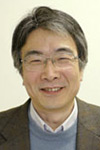Director's Corner
8 June 2006
Today's issue features a Director's Corner from Mitsuaki Nozaki, ILC Regional Director for Asia
Future Particle Physics in Asia
High energy physics is a field of international collaborative efforts, both historically and today. Many non-Asian scientists from around the world are currently participating in the KEKB and neutrino experiments at KEK. Reciprocally, many Asian scientists will work at LHC experiments, which will start to collect data next year. Globalisation of high energy physics programs is an irreversible trend, which continues to grow only stronger. Without a doubt, the future of high energy physics in Asia has to be looked at in this context. Under these circumstances, I believe that scientists in Asia will take what I call a "multi-layered approach", in which a variety of research and educational activities are facilitated in many flavors of settings, across many types of geological and disciplinary boundaries.
I recently joined the KEK management, which is striving to offer research opportunities on the forefront of high energy physics to the younger generation of scientists and engineers. As I see it, the Advanced Accelerator Test Facility (ATF) at KEK is a show-case example. The Superconducting Linac Test Facility (STF) joins the same rank. In addition to various Japan-US and Japan-Europe programs, we are under the support of a Core University Program of Japan Society for the Promotion of Science (JSPS) in Japan. This fund is prepared specifically for exchanging scientists from Japan, China, Korea, and India. There is another grant from JSPS for Detector R&D, as led by Hitoshi Yamamoto of Tohoku University. They are all there to help inspired and enthusiastic colleagues who love science and challenges.
While we emphasise the focused efforts at the GDE for the ILC, we should also keep our eyes on the diversity of the field in and around high energy physics. Many of us witnessed in Bangalore, the Indian quest for a variety of scientific endeavors around particle accelerators. BEPC-II in Beijing is about to revitalise the Chinese high energy physics program. J-PARC, a complex, high-intensity proton facility, is now under construction in Japan. Neutrino physics is a major element within the scientific program at J-PARC. The studies at J-PARC, however, go well beyond particle physics and are expected to contribute to the advancement of condensed matter and life sciences. A large number of smaller-scale, shorter-term experiments may be conducted to rapidly respond to fast progress in these branches of science. Many colleagues working there are people who may have been working with you until yesterday, and many of them might join us at the ILC tomorrow.
We all heard about the EPP2010 (US National Academies' Panel on Elementary Particle Physics in the 21 st Century) report that was published in April 2006, with emphasis and focus on the ILC as a result of deliberation by experts from the fields of physics, economics, astronomy, medicine and industrial sectors. The CERN Council Strategy group gathered in Zeuthen, Germany to discuss the European prospects of particle physics. A strategic document was drafted and will be released at the CERN Council meeting, scheduled for this July in Lisbon.
As for the Asian position towards the linear collider, a series of past ACFA statements, dating back to 1997, with the latest one having been issued in 2004, are available for viewing online. An early analysis on the global efforts for the ILC has been published as part of a "LC Project Report" published in 2003 and is also available online. Although descriptions of many technical aspects are obsolete, it is my opinion that the fundamental philosophy offered in these reports is still completely valid today and constitutes the guiding principles for those who work from Asian institutes.
It is my intention to help strengthen the collaborative relationship within Asia and in the world towards building the ILC by taking full advantage of these facilities, making the best use of funds, noting those guideline statements, and through various forms of collaborative and educational opportunities.
-- Mitsuaki Nozaki, ILC Regional Director for Asia
